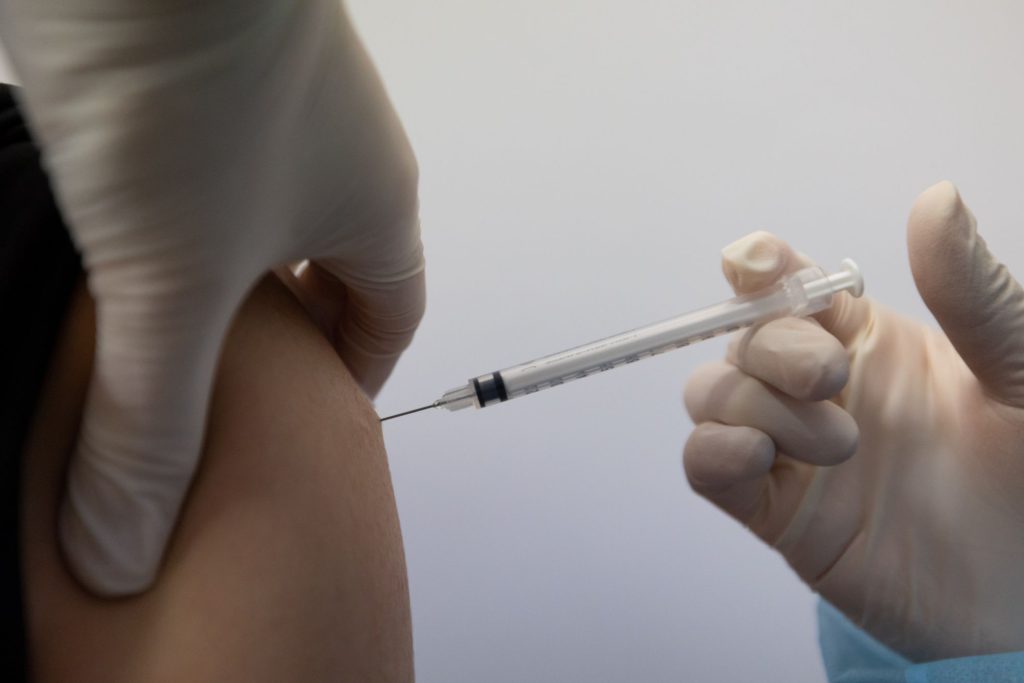(Bloomberg) — U.S. regulators cleared Pfizer Inc.’s Covid-19 booster shot for younger adolescents, widening access to additional doses as parents seek to protect their kids from the omicron wave and school officials try to keep classrooms open.
The Food and Drug Administration said on Monday that it had granted an emergency-use authorization for people ages 12 to 15 to receive a third dose of the messenger RNA vaccine, which Pfizer developed with BioNTech SE.
The agency also reduced the recommended interval between the second and third doses of the Pfizer vaccine for all ages to five months. The FDA still recommends recipients of the Moderna Inc. vaccine, which is also based on mRNA, receive a booster dose at least six months after a second shot.
Peter Marks, the director of the FDA’s Center for Biologics Evaluation and Research, said on a call with reporters that the agency decided to shorten the interval between Pfizer shots based on data submitted by the company. Marks said the FDA was open to considering similar data from Moderna if the company submits it.
In addition to clearing Pfizer boosters for younger teens, the FDA also said that immune-compromised children age 5 to 11 could receive a third primary-series Pfizer shot at least 28 days following their initial two-dose immunization.
Shares of Pfizer, which soared last year as the company benefited from high global demand for its shot, were down 3.8% to $56.83 at 1:21 p.m. in New York.
Next, a Centers for Disease Control and Prevention expert panel is expected to discuss the authorization and make further recommendations about how to dispense the shots. The group, the Advisory Committee on Immunization Practices, is scheduled to meet on Wednesday.
Granting a broader group of teens access to boosters could help tamp down spread of the virus as government officials aim to keep schools open. New daily cases have surged past the peak levels seen in the U.S. a year ago and are expected to continue to climb at least until mid-January.
Still, the campaign to increase protection against omicron among adolescents is likely to face headwinds. Only 53% of people ages 12 to 17 are fully vaccinated with the initial regimen, compared with 73% of adults 18 and older, according to CDC data through Dec. 30. That will limit the pool of adolescents eligible for the extra vaccine dose.
Higher Risk
Many state and local leaders have expressed a desire to avoid moving to hybrid or remote schooling out of concern over other health and educational consequences. With children now returning to school after the holidays, districts are bracing for more students and teachers to contract the virus.
The risk of catching omicron is higher than with other variants, even for fully immunized schoolchildren and adolescents. Studies by the drugmakers and other researchers have found that breakthrough infections with omicron, which accounts for a majority of virus cases in the U.S., are more likely in people who haven’t yet been given a booster shot.
Pfizer said in December that in initial lab studies, company researchers observed a 25-fold reduction in neutralizing antibodies that fight the variant, compared with the original strain of the virus, in people who got two shots. A booster shot restored protection to previous levels.
Some researchers have questioned the need for boosters in younger people, as most adolescents who contract the virus don’t develop severe disease and omicron doesn’t appear to be as virulent as other strains. Additionally, a heart condition called myocarditis has been seen in some people, especially younger males, who have received messenger RNA shots.
The FDA’s Marks said on the call with reporters Monday that myocarditis risks appear to peak at around age 16-17, and that the risks have remained consistent in new data. The majority of cases have been mild, he said.
Recently, the U.S. has seen an increase in hospitalized children with Covid-19. New hospital admissions of those below the age of 18 with the disease have increased 86% to 521 per day on average for the week ending Dec. 31, according to data from the CDC.
Most of the hospitalized children haven’t been vaccinated, according to CDC Director Rochelle Walensky. Children under 5 aren’t yet eligible to receive one of the three vaccines authorized in the U.S.
(Updates to reflect ACIP meeting scheduled for Wednesday)
More stories like this are available on bloomberg.com
©2022 Bloomberg L.P.



